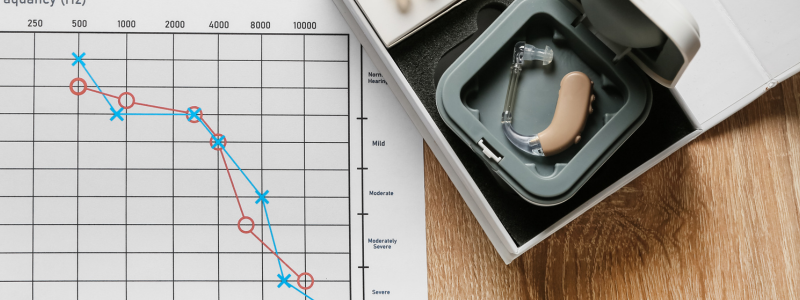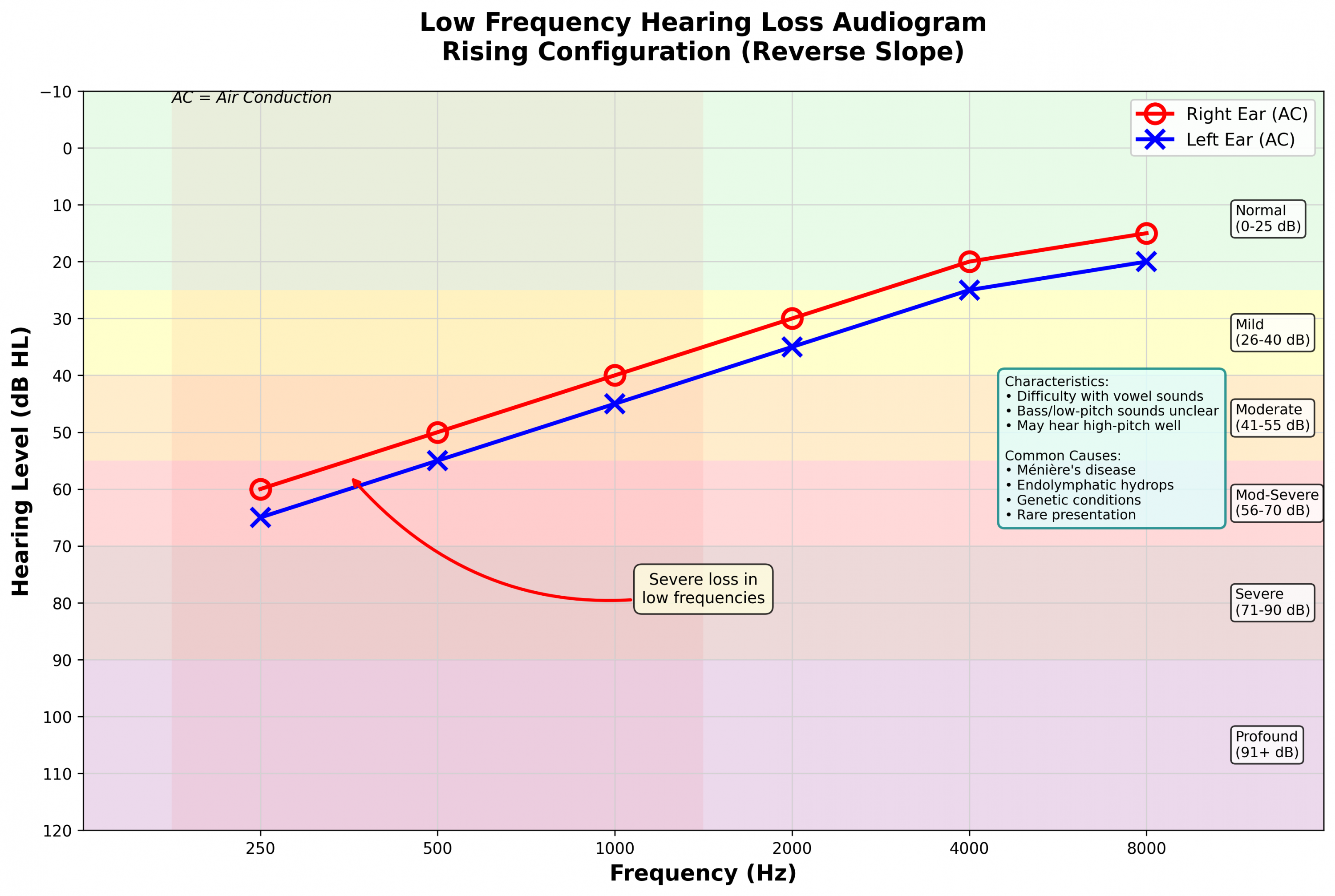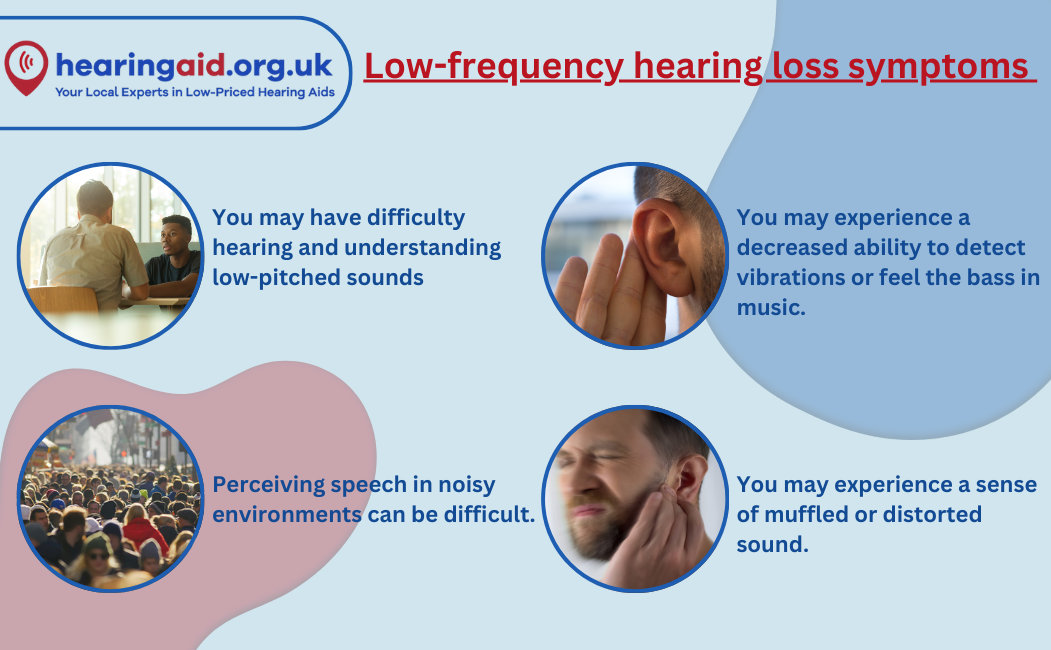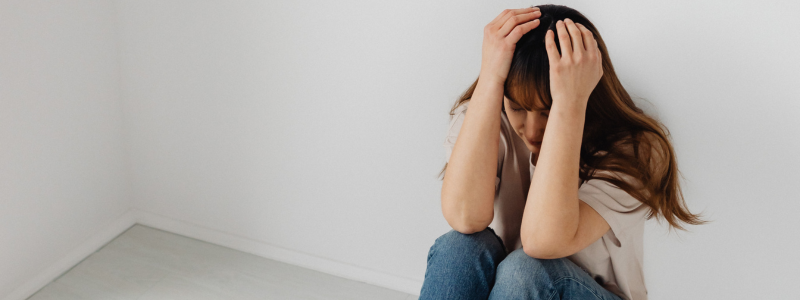
Head of Online Medical Content

Audiology Expert

What is Low-Frequency Hearing Loss?
The causes, risks, symptoms, and treatments of low-frequency hearing loss
Last Hearing Aid UK Update:
Difficulty hearing in the low-pitched range
Low-frequency hearing loss involves difficulty hearing sounds in the lower pitch range. It can result from various factors, including ageing, genetic predisposition, or exposure to loud noise. Symptoms may include trouble understanding speech and detecting certain environmental sounds.
Treatment often involves hearing aids or other amplification devices tailored to address low-frequency sounds. In this article, we will also explore the causes, symptoms, impact, and treatment options associated with low-frequency hearing loss.
If you’ve ever found it hard to catch the deep voice of someone speaking softly or struggled to feel the bassline in your favourite music like you used to, it could be a sign of low-frequency hearing loss.
How is low-frequency loss characterised?
Hearing loss affects many people across the UK. Low-frequency sounds are characterised by their lower pitch and include sounds such as the rumbling of thunder, the deep bass notes in music, and the low tones of human voices.
While high-frequency hearing loss is more widely recognised, low-frequency hearing loss presents its own unique challenges. Understanding the causes and risks associated with low-frequency hearing loss is crucial for prevention, early detection, and targeted treatments.
People with this condition might find it harder to follow a conversation with someone who has a naturally deep voice, especially in places like a busy pub or train station. Because these sounds are so “deep,” missing them can feel like a loss of richness rather than clarity. People may not always notice at first—but over time, it can affect the fullness of everyday listening.

Low-Frequency Hearing Loss
What type of hearing loss is low-frequency hearing loss?
What are low-frequency sounds?
Low-frequency sounds are characterised by their lower pitch and longer wavelengths. These sounds typically range from 20 to 250 Hertz and include deep bass tones, the thumping of drums, and the rumbling of machinery.
Due to their longer wavelengths, low-frequency sounds can travel further distances and penetrate obstacles more effectively than high-frequency sounds. Understanding the unique qualities of low-frequency sounds is essential in comprehending the specific challenges and impact associated with low-frequency hearing loss.
These are the sounds you feel as much as you hear, like the deep drone of a bus engine or the hum of a washing machine in the next room.

Signs and symptoms of low-frequency hearing loss
What should I look out for in regard to low-frequency hearing loss? Individuals with this type of hearing loss often have difficulty hearing and understanding low-pitched sounds, including voices of certain genders or deep tones in music. They may experience a decreased ability to detect vibrations or feel the bass in music.
Speech perception in noisy environments may become challenging, as low-frequency sounds often contribute to background noise. Other common symptoms include a sense of muffled or distorted sound, difficulty locating sounds, and an increased reliance on visual cues for communication.
You might notice you’re struggling to follow a conversation with someone who has a deep voice, especially if there's background noise like traffic or chatter. Watching TV might also be harder, even when you turn it up; some of the sound still feels "flat" or unclear.
Sometimes the symptoms are subtle and gradual—people report things like “I just don’t feel the bass anymore.” Recognising this early can help with better intervention.

Causes and risk factors of low-frequency hearing loss
Can I protect myself from low-frequency hearing loss? Low-frequency hearing loss can be caused by a variety of factors, both acquired and hereditary. Some common causes include exposure to loud noises over an extended period of time, certain medical conditions, genetic predisposition, and ageing.
Prolonged exposure to high-intensity low-frequency sounds, such as machinery noise or loud music, can damage the delicate structures of the inner ear responsible for processing these frequencies.
Medical conditions like Meniere's disease and otosclerosis (the hardening of the hairs in the ear), as well as certain medications known to have ototoxic effects, can also contribute to low-frequency hearing loss. Additionally, as we age, the natural degeneration of the auditory system can lead to a gradual decline in our ability to perceive low-frequency sounds.
If you’ve worked with heavy industrial tools, travelled frequently on underground trains, or even lived near a busy dual carriageway, you may have been exposed to long-term low-frequency noise without realising it.

Low-Frequency Hearing Loss
Testing for low-frequency hearing loss
What can I expect in a hearing test?
Hearing healthcare professionals employ various diagnostic tests to assess the extent and nature of the hearing loss. One common test is pure-tone audiometry, which measures an individual's hearing thresholds across different frequencies, including low frequencies.
The results are plotted on an audiogram, providing a comprehensive picture of the individual's hearing abilities. Speech audiometry may also be conducted to evaluate the person's speech perception and understanding in both quiet and noisy environments.
Furthermore, additional in-depth tests may then be used to evaluate the condition of the middle ear, cochlea, and auditory nerves in certain cases. These diagnostic tests help clinicians determine the type, severity, and underlying causes of low-frequency hearing loss, guiding the development of personalised treatment strategies.
A hearing test is simple and painless, usually done in under an hour. Many UK high street hearing centres offer free tests, so it’s worth getting checked if you've noticed changes.
Treatment options for low-frequency hearing loss
Can low-frequency hearing loss be cured? While there is no cure for low-frequency hearing loss, several treatment options can help individuals manage their condition and improve their quality of life. The choice of treatment depends on factors such as the severity of hearing loss, the underlying cause, and the individual’s specific needs.
Treatments include:
- Hearing aids: Modern digital hearing aids can be programmed to specifically address low-frequency sounds, improving the perception of bass tones and low-pitched voices. Many offer Bluetooth connectivity and companion apps through which levels can be adjusted by the individual.
This means you can boost speech clarity during meetings or adjust settings while watching telly—all from your smartphone.
- Speech therapy: Speech and communication therapy can be beneficial for individuals with low-frequency hearing loss as these therapies focus on improving speech perception, communication strategies and enhancing listening skills in challenging listening environments.
- Cochlear implants: Cochlear implants are electronic devices that can provide direct stimulation to the auditory nerve, allowing individuals with severe hearing loss (usually sensorineural). Cochlear implants could help with either high or low-frequency hearing loss.

Low-Frequency Hearing Loss
Impact and coping strategies for low-frequency hearing loss
What can I do to lessen the effects of low-frequency hearing loss?
Low-frequency hearing loss can have a significant impact on an individual's ability to perceive and understand deep sounds, affecting their enjoyment of music, speech comprehension, and overall communication in various environments. These effects can all lead to a sense of isolation and reduced quality of life.
Making certain adjustments in daily life and the environment can help, including minimising exposure to loud noises, optimising room acoustics, and using visual cues in communication. For example, choosing a quieter spot when dining out or using subtitles during group film nights can make a big difference.
Friends and family can provide support and help by practising clear and direct communication, using visual cues, being patient and understanding, and choosing environments that minimise background noise, such as meeting in quiet cafes over loud bars.
Even simple changes, like turning on a lamp so you can lip-read better or facing each other while chatting, can make everyday interactions easier and more inclusive.
Key takeaways
- Low-frequency hearing loss affects the ability to hear deep, low-pitched sounds, such as bass in music, low voices, or distant machinery.
- These sounds typically fall in the 20–250 Hz range, which are long-wavelength tones that carry differently through environments.
- People with this type of hearing loss may find speech from deep voices hard to understand, notice music sounding less full, and rely more on lip-reading or visual cues.
- Causes can include genetic factors, ageing, conditions like Menière’s disease or otosclerosis, or long-term exposure to low-frequency noise.
- Diagnosis involves audiological tests that measure hearing thresholds at low frequencies and may include examination of the middle and inner ear.
- Treatment options include hearing aids tailored to amplify low-pitched sounds, speech therapy to improve communication, or cochlear implants in more severe cases.
- Coping strategies include avoiding loud low-frequency noise, optimising room acoustics, and using visual support like subtitles or facing speakers directly.
- Low-frequency sounds are important for the richness and feel of music and the environment, so targeted support can significantly improve quality of life.
Conclusion
Low-frequency hearing loss presents unique challenges for individuals, impacting their ability to perceive and understand deep sounds and affecting their overall communication and quality of life.
By understanding the causes, symptoms, and impact of low-frequency hearing loss, we can ensure a speedy diagnosis, and appropriate treatment strategies can be initiated, including the use of hearing aids.
If you or someone you know is missing out on the richness of deep sounds, like music, conversations, or the atmosphere of a busy room, it’s worth getting a hearing test. Help is available, and with the right support, you can reconnect with the sounds that matter most.
Early diagnosis and a personalised hearing strategy (especially with expert audiology support) can make a real difference — helping you reconnect with the richness and depth of sound that matters.
Why Choose Us?
- FREE Hearing Tests
- Best Hearing Aids and Prices
- FREE Aftercare for Life
- FREE Home Visits
- 200+ Local Audiologists
- 60 Day Money Back Guarantee
Think you may be struggling with low-frequency hearing loss?
It is essential to recognise the significant impact of low-frequency hearing loss and implement coping strategies, while friends and family can play a major role in providing support and assistance.
Raising awareness and fostering an inclusive environment can help individuals with low-frequency hearing loss lead fulfilling lives despite these challenges.
If you would like to ask us anything surrounding this article, need additional support on hearing aids, hearing loss, or booking a hearing test - call us free on 0800 567 7621
Other hearing loss awareness articles you might like...
 Hearing aid stigma
Hearing aid stigma  The impact of diet on your hearing
The impact of diet on your hearing  How to tell if hearing loss is permanent or temporary
How to tell if hearing loss is permanent or temporary Our specialist service includes:
Do not spend hundreds of pounds without getting a second opinion from us.
Please call us on 0800 567 7621
 Not only are the prices great, but the service is fantastic! Many thanks to your team.
Not only are the prices great, but the service is fantastic! Many thanks to your team.What's included in our hearing aid prices?
Other pages you might find useful
Common FAQs about hearing aids and hearing loss
In general, any audiologist will always recommend to you the hearing aid model that best suits your needs. Here is a useful checklist to make sure that is the case.
- Audiologist's level of knowledge: The audiologist you have seen will hopefully have a wide knowledge of all available hearing aids; however, some will only be familiar with a small number of brands and, therefore, may not really be in a position to know which model is the best for you. It is OK to challenge their recommendation and ask them to justify why this particular brand is the one for you.
- Do research: Read about the hearing aid that was recommended. Does it seem like it will suit your lifestyle? Does it have more or fewer features than you need?
- Be aware of sales targets: Many high street retailers have specific tie-ins to a particular manufacturer/brand. The hearing aid they have suggested may still be the correct one for you, but do your research so that you know why they might have recommended it.
If you have significant hearing loss in both ears, you should be wearing two hearing aids. Here are the audiological reasons why:
Localisation: The brain decodes information from both ears and compares and contrasts them. By analysing the minuscule time delays as well as the difference in the loudness of each sound reaching the ears, the person is able to accurately locate a sound source.
Simply put, if you have better hearing on one side than the other, you can't accurately tell what direction sounds are coming from.
Less amplification is required: A phenomenon known as “binaural summation” means that the hearing aids can be set at a lower and more natural volume setting than if you wore only one hearing aid.
Head shadow effect: High frequencies, the part of your hearing that gives clarity and meaning to speech sounds, cannot bend around your head. Only low frequencies can. Therefore, if someone is talking on your unaided side, you are likely to hear that they are speaking, but be unable to tell what they have said.
Noise reduction: The brain has its own built-in noise reduction, which is only really effective when it is receiving information from both ears. If only one ear is aided, even with the best hearing aid in the world, it will be difficult for you to hear in background noise as your brain is trying to retain all of the sounds (including background noise) rather than filtering them out.
Sound quality: We are designed to hear in stereo. Only hearing from one side sounds a lot less natural to us.
Fancy some further reading on this topic? You can read about why two hearing aids are better than one in our article, hearing aids for Both Ears, here
For most people, the main benefit of a rechargeable hearing aid is simple convenience. We are used to plugging in our phones and other devices overnight for them to charge up. Here are some other pros and cons:
For anybody with poor dexterity or issues with their fingers, having a rechargeable aid makes a huge difference, as normal hearing aid batteries are quite small and some people find them fiddly to change.
One downside is that if you forget to charge your hearing aid, then it is a problem that can't be instantly fixed. For most, a 30-minute charge will get you at least two or three hours of hearing, but if you are the type of person who is likely to forget to plug them in regularly, then you're probably better off with standard batteries.
Rechargeable aids are also a little bit bigger and are only available in Behind-the-Ear models.
Finally, just like with a mobile phone, the amount of charge you get on day one is not going to be the same as you get a few years down the line. Be sure to ask what the policy is with the manufacturer's warranty when it comes to replacing the battery.
For most people, the answer is yes. But it's never that simple.
The majority of hearing problems affect the high frequencies a lot more than the low ones. Therefore, open fitting hearing aids sound a lot more natural and ones that block your ears up can make your own voice sound like you are talking with your head in a bucket. Therefore, in-ear aids tend to be less natural.
However, the true answer is we can't tell until we have had a look in your ears to assess the size of your ear canal, and until we have tested your hearing to see which frequencies are being affected.
People with wider ear canals tend to have more flexibility, also there are open fitting modular CIC hearing aids now that do not block your ears.
There is also the age-old rule to consider, that a hearing aid will not help you if it's sat in the drawer gathering dust. If the only hearing aid you would be happy wearing is one that people can't see, then that's what you should get.
Most people can adapt to any type of hearing aid, as long as they know what to expect. Have an honest conversation with your audiologist as to what your needs are.
Generally speaking, six or more. Unless it's none at all. The number of channels a hearing aid has is often a simplistic way an audiologist will use to explain why one hearing aid is better than another, but channels are complex, and it is really not that straightforward. Here are some reasons why:
Hearing aids amplify sounds of different frequencies by different amounts. Most people have lost more high frequencies than low, and therefore need more amplification in the high frequencies. The range of sounds you hear is split into frequency bands or channels, and the hearing aids are set to provide the right amount of hearing at each frequency level.
Less than six channels, and this cannot be done with much accuracy, so six is the magic number. However, a six-channel aid is typically very basic with few other features and is suitable only for hearing a single speaker in a quiet room. The number of channels is not what you should be looking at; it's more the rest of the technology that comes with them.
As a final note, different manufacturers have different approaches. One method is not necessarily better than any other. For example, some manufacturers have as many as 64 channels in their top aids. Most tend to have between 17 and 20. One manufacturer has no channels at all.
Manufacturer's warranties typically last between 2-5 years, depending on the brand and model, and cover defects in materials and workmanship. This includes repairs for component failures, electronic malfunctions, and manufacturing defects, but excludes damage from misuse, accidents, or normal wear. Most manufacturers also include loss and damage insurance for the first year.
We handle all warranty claims on your behalf, liaising with manufacturers and ensuring you get replacement devices quickly when needed. This comprehensive warranty coverage, combined with our lifetime aftercare, gives you complete peace of mind.
Our hearing tests are completely free, whether at our clinics or in your home. Unlike other providers who charge £30-£100 for home visits, we believe hearing healthcare should be accessible without financial barriers. Our comprehensive assessments include examination by a registered audiologist, audiogram results, and personalised recommendations.
All testing, future adjustments, and ongoing support are included at no extra cost. While NHS tests are also free, typical 6-week waiting periods often lead people to seek immediate private testing. We provide prompt, professional assessments that fit your schedule and budget.
Yes, we offer completely free home visits throughout the UK, and this service is included in our prices with no additional charges. Home visits are particularly valuable for people with mobility issues, busy schedules, or those who simply prefer the comfort and convenience of their own environment.
Our audiologists can conduct full hearing tests, fit hearing aids, and provide ongoing support in your home. This service sets us apart from many providers who either don't offer home visits or charge extra for them.
We can offer prices up to 40% lower than high street retailers because of our business model. As a network of 200+ independent audiologists, we don't have the massive overheads of large retail chains - no expensive high street premises, no sales targets pushing audiologists to sell the most expensive options, and no costly marketing campaigns.
However, we maintain the same buying power as the big chains because we purchase on behalf of our entire nationwide network. This means you get access to the same premium hearing aids with professional service, but at genuinely competitive prices.
We offer a comprehensive 60-day money-back guarantee, which gives you twice the industry standard time to properly assess whether your hearing aids are right for you. This extended period recognises that adjusting to hearing aids takes time, and your brain needs several weeks to adapt to the amplified sounds.
Unlike many providers who offer just 30 days, we believe 60 days gives you the confidence to test your hearing aids in all the situations that matter to you - from quiet conversations at home to busy restaurants and outdoor activities.
Ask the Experts
6 Morton Lane
Walkwood
Redditch
Worcestershire
B97 5QA
Latest Launch
When we refer to a product as 'Latest Launch', we mean it is the latest to be released on the market.
New
When we refer to a product as 'New', we mean that the product is the newest hearing aid model on the market.
When we refer to a product as 'Superseded', we mean that there is a newer range available which replaces and improves on this product.
Older Model
When we refer to a product as an 'Older Model', we mean that it is has been superseded by at least two more recent hearing aid ranges.
